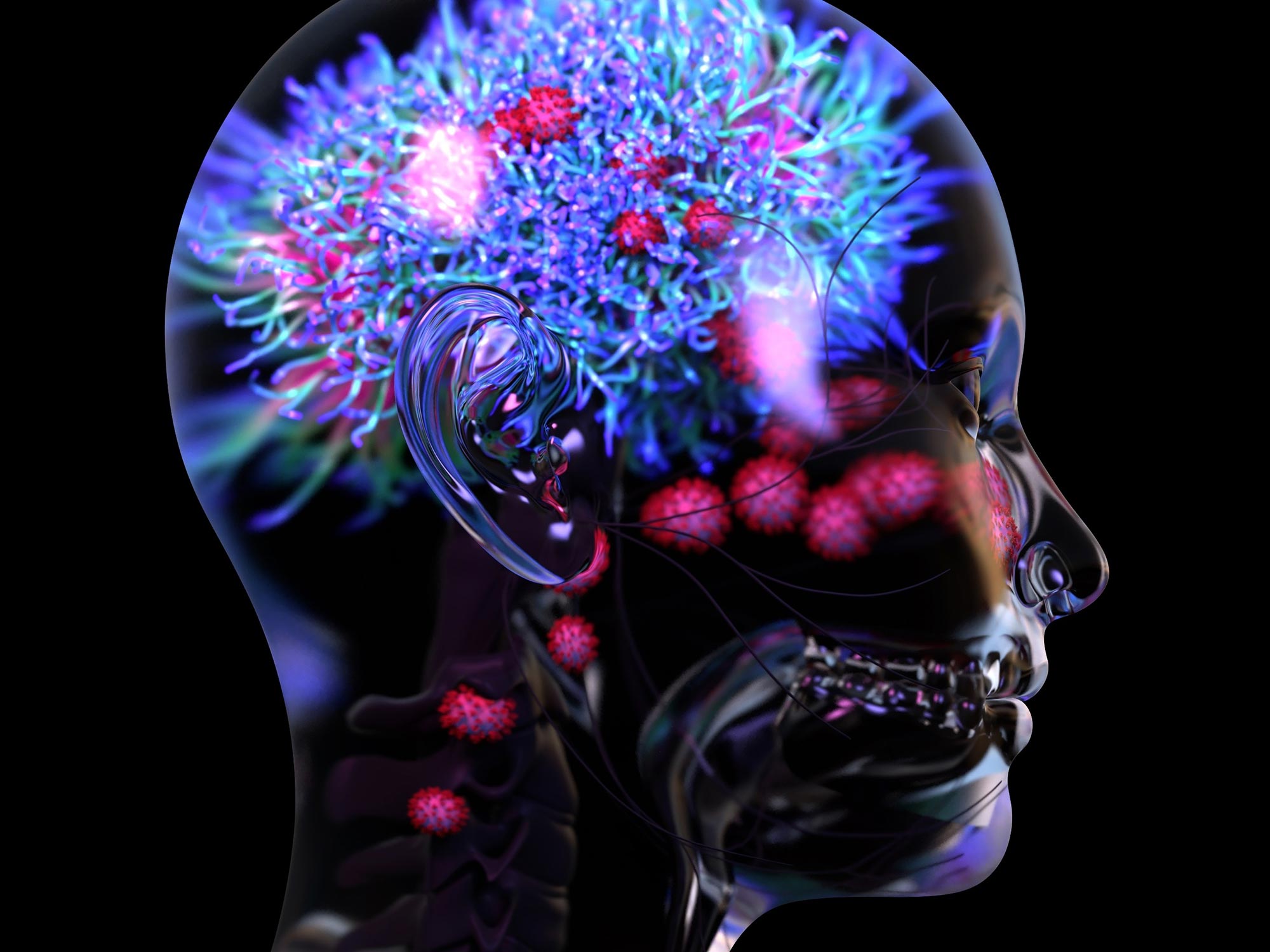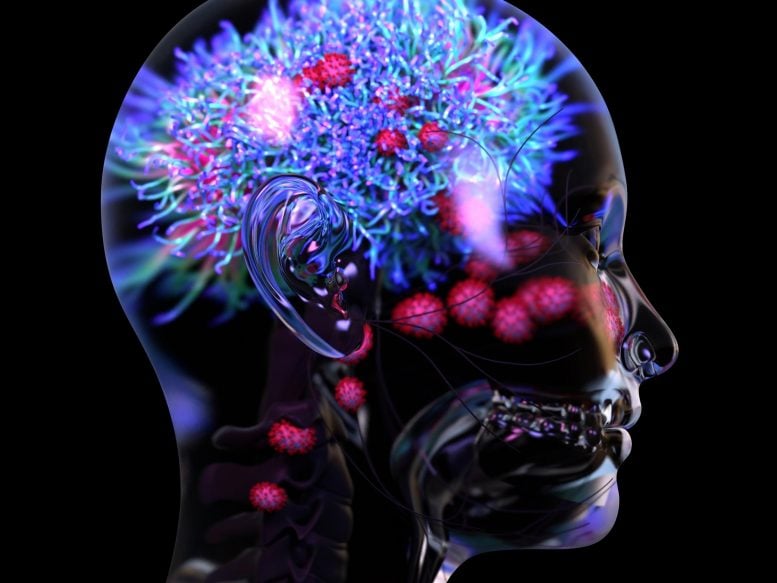

A groundbreaking study has revealed long-term cognitive effects in COVID-19 patients, likening their post-recovery state to accelerated aging.
Findings include diminished brain volume and increased brain injury proteins, emphasizing the severe and lasting impact of the virus on brain health.
UK’s Largest COVID-19 Brain Study
New steps have been taken towards a better understanding of the immediate and long-term impact of COVID-19 on the brain in the UK’s largest study to date.
Published on September 23 in the journal Nature Medicine, the study from researchers led by the University of Liverpool alongside King’s College London and the University of Cambridge as part of the COVID-CNS Consortium shows that 12-18 months after hospitalization due to COVID-19, patients have worse cognitive function than matched control participants. Importantly, these findings correlate with reduced brain volume in key areas on MRI scans as well as evidence of abnormally high levels of brain injury proteins in the blood.
Cognitive Impacts and Brain Changes Post-COVID
Strikingly, the post-COVID cognitive deficits seen in this study were equivalent to twenty years of normal aging. It is important to emphasize that these were patients who had experienced COVID, requiring hospitalization, and these results shouldn’t be too widely generalized to all people with lived experience of COVID. However, the scale of deficit in all the cognitive skills tested, and the links to brain injury in the brain scans and blood tests, provide the clearest evidence to date that COVID can have significant impacts on brain and mind health long after recovery from respiratory problems.
The work forms part of the University of Liverpool’s COVID-19 Clinical Neuroscience Study (COVID-CNS), which addresses the critical need to understand the biological causes and long-term outcomes of neurological and neuropsychiatric complications in hospitalized COVID-19 patients.
Ongoing Cognitive Symptoms and Research Goals
Study author Dr. Greta Wood from the University of Liverpool said: “After hospitalization with COVID-19 many people report ongoing cognitive symptoms often termed ‘brain fog’.
“However, it has been unclear as to whether there is objective evidence of cognitive impairment and, if so, is there any biological evidence of brain injury; and most importantly if patients recover over time.
“In this latest research, we studied 351 COVID-19 patients who required hospitalization with and without new neurological complications. We found that both those with and without acute neurological complications of COVID-19 had worse cognition than would be expected for their age, sex, and level of education, based on 3,000 control subjects.”
Corresponding author Professor Benedict Michael, Professor of Neuroscience at the University of Liverpool said: “COVID-19 is not a condition simply of the lung. Often those patients who are most severely affected are the ones who have brain complications.
“These findings indicate that hospitalization with COVID-19 can lead to global, objectively measurable cognitive deficits that can be identified even 12-18 months after hospitalization.
“These persistent cognitive deficits were present in those hospitalized both with and without clinical neurological complications, indicating that COVID-19 alone can cause cognitive impairment without a neurological diagnosis having been made.
“The association with brain cell injury biomarkers in blood and reduced volume of brain regions on MRI indicates that there may be measurable biological mechanisms underpinning this.
“Now our group is working to understand whether the mechanisms that we have identified in COVID-19 may also be responsible for similar findings in other severe infections, such as influenza.”
Future Research Directions and COVID-CNS Overview
Professor Gerome Breen from King’s College London said: “Long term research is now vital to determine how these patients recover or who might worsen and to establish if this in unique to COVID-19 or a common brain injury with other infections. Significantly our work can help guide the development of both similar studies in those with Long-COVID who often have much milder respiratory symptoms and also report cognitive symptoms such as ‘brain fog’ and also to develop therapeutic strategies.”
Reference: “Post-hospitalisation COVID-19 cognitive deficits at one year are global and associated with elevated brain injury markers and grey matter volume reduction” by Greta K. Wood, Brendan F. Sargent, Zain-Ul-Abideen Ahmad, Kukatharmini Tharmaratnam, Cordelia Dunai, Franklyn N. Egbe, Naomi H. Martin, Bethany Facer, Sophie L. Pendered, Henry C. Rogers, Christopher Hübel, Daniel J. van Wamelen, Richard A. I. Bethlehem, Valentina Giunchiglia, Peter J. Hellyer, William Trender, Gursharan Kalsi, Edward Needham, Ava Easton, Thomas A. Jackson, Colm Cunningham, Rachel Upthegrove, Thomas A. Pollak, Matthew Hotopf, Tom Solomon, Sarah L. Pett, Pamela J. Shaw, Nicholas Wood, Neil A. Harrison, Karla L. Miller, Peter Jezzard, Guy Williams, Eugene P. Duff, Steven Williams, Fernando Zelaya, Stephen M. Smith, Simon Keller, Matthew Broome, Nathalie Kingston, Masud Husain, Angela Vincent, John Bradley, Patrick Chinnery, David K. Menon, John P. Aggleton, Timothy R. Nicholson, John-Paul Taylor, Anthony S. David, Alan Carson, Ed Bullmore, Gerome Breen, Adam Hampshire, COVID-CNS Consortium, Benedict D. Michael, Stella-Maria Paddick and E. Charles Leek, 23 September 2024, Nature Medicine.
DOI: 10.1038/s41591-024-03309-8
This publication was funded by the UK Research and Innovation (UKRI) grant COVID-CNS and is supported through the national NIHR BioResource and the NIHR Cambridge Biomedical Research Centre. We thank NIHR BioResource team and patient volunteers for their participation and the Patient and Public Involvement Panel who guided each stage.
More About COVID-CNS
The COVID-19 Clinical Neuroscience Study (COVID-CNS) is a £2.3m UKRI study jointly led by researchers at the University of Liverpool and King’s College London. Acute neurological and neuropsychiatric complications of COVID-19 affect up to 20-30% of hospitalized patients. Researchers are studying the acute neurological and neuropsychiatric effects of infection, the long-term clinical and cognitive outcomes, and crucially determining the underlying biological processes driving this through better understanding of brain injury, immune responses, and genetic risk factors.